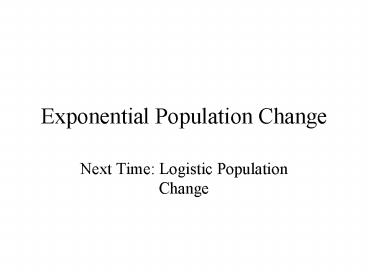Exponential Population Change PowerPoint PPT Presentation
1 / 19
Title: Exponential Population Change
1
Exponential Population Change
- Next Time Logistic Population Change
2
Kudzu Introduced
Whitetails Range Expansion Colonization
Lesser Snow Geese Anthropogenic
3
Population Dynamics
- Why do we care?
- Can past dynamics inform us about current and
future dynamics - Nt1 Nt B I - D - E
- Simple, but
- Models Simplifications of Reality
- Simple enough to be interpretable and complex
enough to be realistic - Managing in the face of uncertainty, with the
goal of reducing it - Adaptive Management
4
Exponential Population Models
- Ingredients
- Lambda (?) finite rate of change (increase or
decrease) - The proportional change in abundance over an
interval of time
?
?
5
How do we interpret Lambda?
- ? 1.00, abundance is constant
- ? gt 1.00, abundance is increasing
- Rate (? - 1.0)100
- ? lt 1.00, abundance is decreasing
- Rate (? - 1.0)100
6
How big, or small, is Lambda?
?
7
Assumptions
- No immigration or emigration
- Relax later
- Constant birth and death rate
- No sex, time, or space specificity
- Rate of change is independent of abundance
- Growth occurs in discrete steps
8
Exponential Change
- Change by constant factor each step
- Multiply by constant (geometric)
- Not Arithmetic change change by constant
difference (add a constant value) - Nt1 Nt ? (e.g, 2004 to 2005)
- Nt2 Nt ? ?
- Nt2 Nt ?2
- and
- Nt2/ Nt ?2 . ? sqrt (?2 ) or tth root
- not ?/2
9
Exponential Change in Cows
- 1.44
- N1 10
10
Other Characteristics of ?
- Can not changed by scaling
- ?/2 NO
- Can not be added together
- Geometric
- Sometimes expressed as R
- R (? - 1)
11
Instantaneous Rate of Change
- r Malthusian parameter
- Continuous not Discrete
- Differential Equation
- Very small time interval
12
Characteristics of r
- r 0.0, abundance stable
- r gt 0.0, abundance increasing
- r lt 0.0, abundance decreasing
- er
- r ln(?)
13
Other Characteristics of r
- Can be summed and changed by scaling
- E.g., if r 0.101 day, what is r per hour?
- (0.101/24 0.0042)
- What is ? per hour?
?
14
Can you Determine Doubling Rate or Halving Rate
for a Population?
15
Graphic Representation of Exponential Change for
No 10 and ? 1.2
16
(No Transcript)
17
Kudzu Southeastern U.S.
- Introduced
- Japan 1978
- Now covers 7 million acres
- Other introduced plants
- Purple Loosestrife
- Russian Knapweed
18
George Reserve Deer
In 1928, six white-tailed deer (2 males, 4
females) were introduced to the Edwin S. George
Reserve, a two-square-mile fenced area in
southeastern Michigan. Six years later, in 1933,
the first drive census showed 160 deer. This
remarkable growth of deer population became a
landmark in the young field of wildlife
management.
19
Lesser Snow Geese - Anthropogenic
Mid-continent
La Perouse Bay

